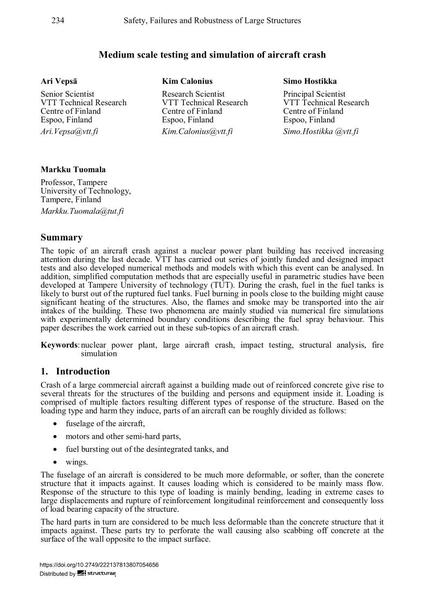Medium Scale Testing and Simulation of Aircraft Crash

|
|
|||||||||||
Détails bibliographiques
| Auteur(s): |
Ari Vepsö
Kim Calonius Simo Hostikka Markku Tuomala |
||||
|---|---|---|---|---|---|
| Médium: | papier de conférence | ||||
| Langue(s): | anglais | ||||
| Conférence: | IABSE Workshop: Safety, Failures and Robustness of Large Structures, Helsinki, Finland, 14-15 February 2013 | ||||
| Publié dans: | IABSE Workshop, 14-15 February 2013, Helsinki | ||||
|
|||||
| Page(s): | 234-241 | ||||
| Nombre total de pages (du PDF): | 8 | ||||
| Année: | 2013 | ||||
| DOI: | 10.2749/222137813807054656 | ||||
| Abstrait: |
The topic of an aircraft crash against a nuclear power plant building has received increasing attention during the last decade. VTT has carried out series of jointly funded and designed impact tests and also developed numerical methods and models with which this event can be analysed. In addition, simplified computation methods that are especially useful in parametric studies have been developed at Tampere University of technology (TUT). During the crash, fuel in the fuel tanks is likely to burst out of the ruptured fuel tanks. Fuel burning in pools close to the building might cause significant heating of the structures. Also, the flames and smoke may be transported into the air intakes of the building. These two phenomena are mainly studied via numerical fire simulations with experimentally determined boundary conditions describing the fuel spray behaviour. This paper describes the work carried out in these sub-topics of an aircraft crash. |
||||

